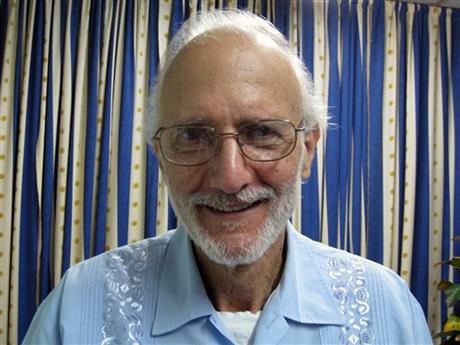
The United States and Cuba will start talks on normalizing full diplomatic relations, marking the most significant shift in U.S. policy toward the communist island in decades, American officials said Wednesday. The announcement comes amid a series of new confidence-building measures between the longtime foes, including the release of American Alan Gross and the freeing of three Cubans jailed in the U.S.
President Barack Obama was to announce the policy changes from the White House at noon Wednesday.
Sen. Marco Rubio, R-Florida, said the U.S. and Cuba were moving toward normalized banking and trade ties. He also said the U.S. was poised to open an embassy in Havana in the coming months.
“This is going to do absolutely nothing to further human rights and democracy in Cuba,” Rubio said in an interview. “But it potentially goes a long way in providing the economic lift that the Castro regime needs to become permanent fixtures in Cuba for generations to come.”
Gross, 65, was on an American government plane bound for the U.S. Wednesday morning after being released on humanitarian grounds by the Cuban government at the request of the Obama administration. As part of the secret negotiations to secure his release, the U.S. was releasing three Cuban jailed in Florida for spying.
Cuba President Raul Castro planned to speak at noon about Gross’ release, according to Cuba’s U.N. mission.
Obama administration officials have considered Gross’ imprisonment an impediment to improving relations with Cuba.
Cuba was also releasing a non-American intelligence “asset” along with Gross, according to a U.S. official. That official and others spoke on the condition of anonymity because they were not authorized to be identified by name before Obama’s remarks.
Bonnie Rubinstein, Gross’ sister, heard the news from a cousin, who saw it on television.
“We’re like screaming and jumping up and down,” she said in a brief telephone interview from her home in Texas.
Gross was detained in December 2009 while working to set up Internet access as a subcontractor for the U.S. government’s U.S. Agency for International Development, which does work promoting democracy in the communist country. It was his fifth trip to Cuba to work with Jewish communities on setting up Internet access that bypassed local censorship.
Cuba considers USAID’s programs illegal attempts by the U.S. to undermine its government, and Gross was tried and sentenced to 15 years in prison.
The three Cubans released in exchange for Gross are part of the so-called Cuban Five — a group of men who were part of the “Wasp Network” sent by Cuba’s then-President Fidel Castro to spy in South Florida. The men, who are hailed as heroes in Cuba, were convicted in 2001 in Miami on charges including conspiracy and failure to register as foreign agents in the U.S.
Two of the Cuban Five were previously released after finishing their sentences.
In a statement marking the fifth anniversary of Gross’ detention earlier this month, Obama hinted that his release could lead to a thaw in relations with Cuba.
“The Cuban Government’s release of Alan on humanitarian grounds would remove an impediment to more constructive relations between the United States and Cuba,” Obama said in a statement.
Gross’ family has said he was in ailing health. His wife, Judy, said in a statement earlier this month that Gross has lost more than 100 pounds, can barely walk due to chronic pain, and has lost five teeth and much of the sight in his right eye. He has begun refusing to see his wife and daughter, the new chief of the U.S. Interests Section in Havana and members of Cuba’s small Jewish community, who had been visiting him on religious holidays.
Obama has taken some steps to ease U.S. restrictions on Cuba after Raul Castro took over as president in 2010 from his ailing brother. He has sought to ease travel and financial restrictions on Americans with family in Cuba, but has resisted calls to drop the embargo.
Among the expected changes as a result of the improvement in U.S.-Cuba relations is that licensed American travelers to Cuba will now be able to return to the U.S. with $400 in Cuban goods, including tobacco and alcohol products worth less than $100 combined. This means the long-standing ban on importing Cuban cigars is over, although there are still limits, according to a U.S. official who spoke on condition of anonymity ahead of the official White House announcement.
The surprise prisoner swap has echoes of the deal the U.S. cut earlier this year to secure the release of Army Sgt. Bowe Bergdahl, who had been held by the Taliban. In exchange for his release in May, the U.S. turned over five Taliban prisoners held at the Guantanamo Bay detention center.
_
Associated Press writers Jessica Gresko, Jack Gillum, Ken Dilanian and Edie Lederer contributed to this report.
_



